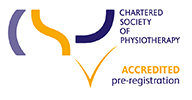
Physiotherapy
BSc (Hons)
- Typical offer for 2024
- Duration
- UCAS code
Suitable for applications.
The chance to go out on placement and work in the clinic here on campus has been really valuable - it's a great way to gain hands-on experience. I've worked in different areas gaining experience in a lot of the core areas, including musculoskeletal, neuro, cardiovascular and respiratory. For my elective placement I worked with patients at Pinderfields Hospital suffering from acute stroke, because this is an area that I'm particularly interested in.
Placement Year
You will undertake 1000 hours of clinical placements in year two and three. Prior to commencing placements in year two, there are ‘preparation for practice’ sessions to ensure that students are as well prepared as possible with regard to the expectations of work based learning. There is a debrief session back in the University at the end of the placement to support your integration of theory and practice learning.
Your first placement is ‘formative’, which means it is not credit rated but is marked on a pass/fail basis. This placement will give you experience of working in health and care settings and allow you to practice the professional and communication skills required to work in such environments before embarking on credit-rated placements later in the second year.
Placement locations are sourced for you by the Faculty. The variety of placements may entail some degree of travel and/or accommodation costs which is typical of physiotherapy education in the UK. However, we expect to be able to source many of our placements in the Bradford/Airedale and Leeds areas.
‘You will have access to the University's Physiotherapy and Sport Rehabilitation Clinic, and the majority of students will complete one of their clinical placements in this setting.’
Placement experience allows you to:
- experience professional clinical environments
- problem solve with real people and situations
- integrate theory into practice
- learn and improve practical skills
- consolidate learning from modules
- begin to use reflection in and on action
- experience multi-professional working
- develop your professional identity and communication skills
Placement experiences will reflect the diverse nature of the profession and also enable you to work with diverse populations and differing multi-disciplinary teams. You can expect to work in any environment in which you would find a physiotherapist. You must complete a minimum of 1000 hours of placement learning over the three years of the programme.
Placements are assessed with marks contributing to your overall degree classification.
Learning and assessment
A major focus of the course is on problem solving and clinical reasoning. Some large group teaching utilises the concept of team-based learning (TBL) whereby some knowledge-based content is studied out of class and is then assessed by answering multiple choice questions individually then as a small group or ‘team’.
Lectures are supplemented with small group tutorials and practical sessions to facilitate an active and collaborative approach to learning. Case-based scenarios are used to facilitate the development of clinical reasoning skills. Reflection is embedded at all levels. These skills are ultimately evidenced in the practice setting.
The programme uses a diverse range of assessment strategies that accommodate different learning styles. These include:
- some continuous assessment of competence-based clinical skills
- practical assessments that are designed to mirror the clinical environment
- assessments that require you to demonstrate academic writing skills
- a common assessment tool for practice placements, used collaboratively with three universities in the region
- group and individual presentation tasks
What our students say
Study support
The Faculty of Health Studies has a dedicated student support office. MyBradford, based in our main Richmond Building, can also provide advice on course fees and maintenance grants/loans from the Student Loans Company.
As a student at the Faculty of Health Studies, you are also able to access the University’s other student support facilities, including the Academic Skills Advice Service, the Counselling Service and the Disability Service.
Research
There is a growing research base within the Faculty of Health Studies. Many of those who will teach on the programme are research active, publishing and presenting internationally.
There are opportunities for students to engage with this research. The research modules are specifically designed for students to work alongside academic staff to develop vocationally relevant research that has the potential to influence and develop practice in the field, and places students at the forefront of knowledge discovery.


